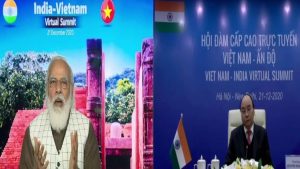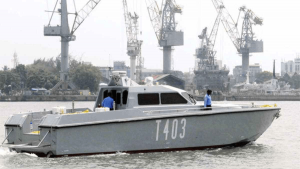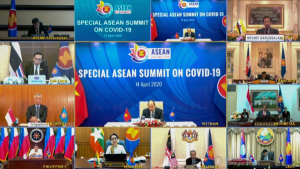
The first-ever virtual summit between the prime ministers of India and Vietnam has ushered in a new era of Comprehensive Strategic Partnership between the two close partners as they signed crucial pacts in diverse areas, including defence, development and energy. Raising the level of ambition for their burgeoning partnership, the two leaders unveiled the overarching document entitled “Joint Vision for Peace, Prosperity and People,” which will guide their multi-faceted relations in years to come.
The wide-ranging talks via video-conference between Prime Minister Narendra Modi and his Vietnamese counterpart Nguyen Xuan Phuc on December 21 has paved the way for an exponential growth in this crucial partnership which will not only positively impact the lives of people in the two countries, but will also underwrite regional peace and stability.
Mutually Empowering Ties
The virtual summit interaction saw the two leaders showering praise on each other and a forceful reaffirmation by them of the critical importance of each other in their respective foreign policy calculus. Building on deep-rooted historical and cultural bonds, shared values and interests, the two leaders decided to intensify regular high-level and institutionalized exchanges which will add new substance and impetus to multi-layered bilateral cooperation. The major takeaway from the summit was the forging of a new template of supporting each other’s national development and working closely for achieving a peaceful, stable, secure, free, open, inclusive and rules-based region.
In his remarks at the virtual summit, PM Modi described Vietnam as “an important pillar of India’s Act East policy and an important ally of our Indo-Pacific vision,” thereby encapsulating rapid transformation in India-Vietnam ties since the two sides elevated their relations to the level of Comprehensive Strategic Partnership in 2016. Nyugen Xuan Phuc, on his part, said the upgrading of bilateral ties to the level of Comprehensive Strategic Partnership in 2016 had bolstered trust and understanding of each other’s vision and interests on international issues.
“We see our relationship with Vietnam from a long-term and strategic view. Peace, stability and prosperity are our common objectives in the Indo-Pacific region. Our partnership can contribute significantly to maintain stability and peace in the region,” PM Modi said.
Alluding to seven agreements signed by the two countries encompassing diverse issues such as defence, nuclear power, petrochemicals, renewable energy and treatment of cancer, PM Modi said: “We are also taking new initiatives in the area of our development cooperation and cultural conservation. All this shows the expansion and potential of our growing mutual cooperation.” he added.
Building on the big-picture vision document the two sides launched a plan of action for bilateral engagements during 2021-23. “This joint vision for peace, prosperity and people will send a strong message to the world about the depth of our relationship,” PM Modi said.
Scaling up Defence & Strategic Ties

Amidst the emerging geopolitical and geoeconomics landscape in the region and beyond, the expansion of defence and security partnership has been identified as the major focus area in India-Vietnam partnership. “The leaders agreed that enhanced defence and security partnership between India and Vietnam will be an important factor of stability in the Indo-Pacific region,” said the joint statement. This was telescoped in the digital handover of the first of 12 High-Speed Guard Boat to Vietnam under the $100 million Defence Line of Credit extended by New Delhi to Hanoi. During the virtual summit, the two sides also launched manufacturing of High-speed Guard Boats and keel laying of 7 such boats which will be manufactured in Vietnam. This upgraded defence partnership will include intensification of military-to-military exchanges, training and capacity building programmes across the three services and coast guards. Looking ahead, defence industry collaboration, building on India’s defence credit lines extended to Vietnam, will be a key priority.
South China Sea & Maritime Security
With an eye on China, the leaders of India and Vietnam have sent a pointed message that they will cooperate proactively to counter any attempt to alter the status quo in South China Sea. Close and relentless cooperation in maintaining peace, stability, security and freedom of navigation and overflight in the South China Sea will continue to drive India-Vietnam maritime and security partnership. At the digital summit, the two leaders underlined the imperative for peaceful resolution of disputes in accordance with international law, particularly the 1982 United Nations Convention on the Law of the Sea (UNCLOS), without resorting to threat or use of force. The two leaders converged on their common position that all activities in the oceans and seas must be carried out must be guided by the legal framework set out by the UNCLOS. Looking forward, the two countries will continue to espouse vigorously that UNCLOS is the basis for determining maritime entitlements, sovereign rights, jurisdiction and legitimate interests over maritime zones.
The joint statement stressed on full and effective implementation of the Declaration on the Conduct of Parties in the South China Sea (DOC) in its entirety and the substantive negotiations towards the early conclusion of a substantive and effective Code of Conduct in the South China Sea (COC) in accordance with international law, especially UNCLOS, that does not prejudice the legitimate rights and interests of all nations including those not party to these negotiations.
Partnering in Indo-Pacific
The strategic importance of India-Vietnam partnership will continue to grow due to a growing convergence of interests in the Indo-Pacific, bilaterally as well in the context of ASEAN. In this context, the two leaders decided at the virtual summit to enhance practical cooperation between ASEAN and India in in line with the objectives and principles as stated in the ASEAN Outlook on Indo-Pacific (AOIP) and India’s Indo-Pacific Oceans Initiative (IPOI).
Global Challenges

The virtual summit has provided a fresh impetus to enhancing cooperation in cross-cutting issues such as terrorism, pandemics and sustainable development. Building on the digital summit, as India and Vietnam concurrently serve as non-permanent members of the UN Security Council from 2021, they will actively promote reformed multilateralism to make international organizations, including the UN Security Council, more representative, contemporary and capable of dealing with current challenges.

India-Vietnam cooperation in the ASEAN is also set to grow from strength to strength. Prime Minister Narendra Modi and Prime Minister Nguyen Xuan Phuc co-chaired the 17th ASEAN-India Summit and articulated their shared interests in maintaining regional rules-based order centred upon ASEAN and to promote freedom of navigation.

“Thanks to the support and collaboration of India, Vietnam finished the ASEAN chairmanship with multiple accomplishments. A record number of 80 agreements have been signed and approved,” said Vietnam’s Ambassador to India Pham Sanh Chau. As chair of ASEAN, Vietnam played a key role in maintaining solidarity among ASEAN members to deal with the Covid pandemic and reached a record number of agreements.
Economic Ties & Supply Chain Collaboration:
Vietnam has emerged as a star economic performer in the pandemic period and has entrenched its reputation as the fastest growing economy in the ASEAN region. Amid green shoots of economic recovery, the two sides have decided to work towards reliable, efficient and resilient supply chains, and to promote human-centric globalization. At the summit, the two sides decided to redouble efforts to achieve the target of US$15 billion of bilateral trade. New supply chains located in each other’s country will have a force multiplier effect on the partnership.
New Horizons
The economic and development partnership will be animated by new horizons for partnership created by India’s goal to become a US$5 trillion economy by 2024 and Vietnam’s ambition to become a high-income economy by 2045. This new phase of economic partnership will be underpinned by new technologies, innovation, and digitization to deliver good governance, people’s empowerment, and sustainable and inclusive development. Going forward, the two countries will harness synergies between India’s “Digital India” mission and Vietnam’s “Digital Society” vision. The two strategic partners will deepen cooperation in peaceful uses of nuclear and space technologies, transformative technologies in Information and Communication Technology, ocean sciences, sustainable agriculture, water resource management, holistic healthcare, vaccines and pharmaceuticals, smart cities and start-ups.
Energy in Ties
Taking a strategic vision of their energy partnership, the two sides are poised to widen their cooperation in new and renewable energy resources, energy conservation and other climate-resilient technologies. “Vietnam’s possible future participation in International Solar Alliance would bring new opportunities for cooperation in large scale deployment of solar energy,” said the joint statement.
The focus on renewables will be accompanied by enhancing partnership in the oil and gas sector, including through possible exploration projects in third countries and collaboration in downstream projects.
In the days to come, India’s development assistance and capacity building outreach in Vietnam will be further reinforced, including by expanding the Mekong – Ganga Quick Impact Projects and ITEC and e-ITEC programmes in diverse sectors.
The Road Ahead
Looking ahead, based on the 2020 Vision Statement, India and Vietnam will consolidate and expand progress in all areas which will make India and Vietnam an indispensable partner in each other’s development and resurgence. The shared challenge from China will drive the two countries to deepen their partnership in the Indo-Pacific and in the global arena, which will make them crucial to a stable and prosperous Asia and the region at large. The digital summit has set the perfect stage for the celebrations of the 5th anniversary of establishment of the Comprehensive Strategic Partnership in 2021 and the 50th year anniversary of Diplomatic Relations between the two countries in 2022.
Author Profile

- Manish Chand is Founder and Editor-in-Chief of India Writes Network (www.indiawrites.org) and India and World, a pioneering magazine focused on international affairs. He is CEO, Centre for Global India Insights, an India-based think tank focused on global affairs.
Latest entries
 India and the WorldFebruary 17, 2026South-by-South: Focus on people-centric solutions at India AI summit
India and the WorldFebruary 17, 2026South-by-South: Focus on people-centric solutions at India AI summit India and the WorldFebruary 7, 2026Modi hails interim India-US trade deal, Goyal says no concessions made on agriculture
India and the WorldFebruary 7, 2026Modi hails interim India-US trade deal, Goyal says no concessions made on agriculture India and the WorldFebruary 2, 2026Trump announces trade deal with India, Modi ‘delighted’
India and the WorldFebruary 2, 2026Trump announces trade deal with India, Modi ‘delighted’ India and the WorldJanuary 31, 2026Palestinian minister bats for mediatory role for India in ending Gaza conflict
India and the WorldJanuary 31, 2026Palestinian minister bats for mediatory role for India in ending Gaza conflict







